




collegiatetimes.com






collegiatetimes.com
In the 2020-21 academic year, there were 298 student reports of gender-based harassment and violence at Tech.
Virginia Tech’s United Feminist Movement gathered with other students on campus on Wednesday, April 26, for the organization’s annual Take Back the Night rally. The rally is a long-standing tradition at Virginia Tech and at universities across the country that dates back to over 30 years ago and is meant to protest against sexual and gender-based violence on campus and in the local community.
The rally began at 6:30 p.m. with music and a series of speakers, some of whom included Carolina Bell, UFM’s president, and three different survivors of violence who wanted to tell their stories before proceeding to march all over campus.
According to the National Sexual Violence Resource Center, over one in five, or 25.5 million American women have experienced completed or attempted rape during their lifetime, along with 24.8% of American men who have also experienced some form of sexual violence. Furthermore, across 33 of the major U.S. universities, one in four
Impartiality means reporting, editing and delivering the news honestly, fairly, objectively and without opinion or bias.
Credibility is the greatest asset of any news medium, and impartiality is the greatest source of credibility.
To provide the most complete report, a news organization must not just cover the news, but uncover it. It must follow the story wherever it leads, regardless of any preconceived ideas on what might be most newsworthy.
The pursuit of truth is a noble goal of journalism. But the truth is not always apparent or known immediately. Journalists’ role is therefore not to determine what they believe at that time to be the truth and
undergraduate women have undergone some form of sexual assault. In the 2020–21 academic year, Virginia Tech received 298 reports from students of gender-based harassment and violence.
“It’s an extremely widespread issue,” said Jenna Malyn, a junior marketing and business management major who also serves as the communications chair for the UFM. “I think this does a great job of putting it into perspective: the crime alert emails that you receive — like, you receive a lot of those emails, and it’s important to understand that those are only things that occur on Virginia Tech campus, so anything that occurs downtown or at an apartment complex is not even counted on those emails.”
To further put this problem into perspective, many victims do not even feel safe enough to report their assaults to the police. In 2018, only 25% of sexual assaults were reported. Many survivors report having their stories ignored or disbelieved, losing
friends or having their perpetrators threaten them again when they attempt to tell their story. According to Malyn, at Virginia Tech, survivors face a particular obstacle of their perpetrators frequently being let off when their crime is reported.
“The actual process of reporting the crime that’s happened to you is very difficult for survivors,” Malyn said. “Even if a survivor thinks that they have a really strong case and they have tangible evidence, things can still not pan out, and a perpetrator can appeal a sentence as many times as they want. For example, a survivor was talking last night about how her perpetrator got three semesters being expelled from Virginia Tech, and then they were able to appeal that, and it got all erased.”
direct funding from the university. It’s just not acceptable,” Malyn said. “And these are things that the frat council will try to cover up and hide because they don’t want it to be public knowledge, but it’s very known and I think it’s a big issue.”
Malyn emphasized how difficult it is for survivors to feel heard. She recommended that for anyone who doesn’t know where to turn, Virginia Tech’s Women’s Center is a great starting point.
reveal only that to their readers, but rather to report as completely and impartially as possible all verifiable facts so that readers can, based on their own knowledge and experience, determine what they believe to be the truth.
When a news organization delivers both news and opinions, the impartiality and credibility of the news organization can be questioned. To minimize this as much as possible there needs to be a sharp and clear distinction between news and opinion, both to those providing and consuming the news.
Voice your opinion. Send letters to the Collegiate Times.
365 Squires Student Center Blacksburg, VA, 24061 opinionseditor@collegiatetimes.com
All letters must include a name and phone number. Students must include year and major. Faculty and staff must include position and department. Other submissions must include city of residence and relationship to Virginia Tech (i.e., alumni, parent, etc.). We reserve the right to edit for any reason. Anonymous letters will not be printed.
Letters, commentaries and editorial cartoons do not reflect the views of the Collegiate Times. Editorials are written by the Collegiate Times editorial board, which is composed of the opinions editors, editor in chief and managing editors.
Malyn stated that the university is not doing enough to help survivors. Although President Sands created the Sexual Violence Culture and Climate Work Group in 2021, Malyn explained that there is little transparency within the group about what they are actually accomplishing, and students are seeing minimal results on a policy level. Meanwhile, known perpetrators continue to walk free on campus.
“I don’t think we do a good enough job of making survivors feel safe on our campus, especially when we see frats with many known rapists in them, and they’re still getting
NEWSROOM 231-9865
Editor-in-Chief: Momiji Barlow (editor@collegiatetimes.com)
Managing editors: Colleen Henneberry and Victoria Weber
Design editor: Sydney Johnson
Assistant design editors: Annmarie Leake and Nanami Nishimoto
Copy editors: Emily Burch, Riley Vinluan, and Sarah Hevener
News editors: Jane Park
Lifestyles editor: Emanda Seifu
Sports editors: Amber Williams and Colby Talley
Opinions editor: Olivia Nelson
“I think the Women’s Center is a fantastic place. It’s probably the best place for you to turn first, because people there are going to be trained in how to deal with survivors, and how to give them the proper resources,” Malyn said. “Start there, and they’ll kind of guide you to which resources will be best for you.”
Furthermore, Malyn urges any interested student to get involved in the UFM, an intersectional organization that fights for all-encompassing social equality. Students can begin by following their Instagram to receive updates on meetings and events.
“We welcome absolutely anyone, you can be from any background, and obviously, you do not have to be a woman to join UFM. We take anyone and we will accept you, and it’s a very welcoming environment,” Malyn said.
Malyn reminds survivors of the many other continued on page 3
editor: Hamad Alhendi
Social media editors: Emily Logue (Twitter), Deanna Driver (Facebook)
Have a news tip? newstips@collegiatetimes.com
BUSINESS STAFF 231-9860
Business manager: Charlie Setash (business@collegemedia.com)
MEDIAMATE
888-897-7711 collegiatetimes.com/media_kit/ orders@mymediamate.com
The Collegiate Times, a division of the Educational Media Company at Virginia Tech, was established in 1903 by and for the students of Virginia Polytechnic Institute and State University. The Collegiate Times is published every Tuesday of the academic year except during exams and vacations. To order a reprint of a photograph printed in the Collegiate Times, visit reprints.collegemedia.com. The Collegiate Times is a division of the Educational Media Company at Virginia Tech, Inc., a 501(c)3 nonprofit with a mission to provide educational experience in business and production of mass media for Virginia Tech students. © Collegiate Times, 2020. All rights reserved. Material published in the Collegiate Times is the property thereof, and may not be reprinted without the express written consent of the Collegiate Times.
Advertisements do not necessarily reflect the opinions of the Collegiate Times. Read about our organization’s Core Values online at collegiatetimes.com.
continued from page 2
students on campus who have experienced similar trauma and who will support and welcome them with open arms.
“If you are a survivor on campus, please know that you’re not alone. There’s so many people that have had similar experiences, especially here at Virginia Tech, and I think
UFM is a great way to find other survivors and connect with them,” Malyn said. “Please just know you’re not alone, and there’s so many people that want to fight with you and believe
you.”
Better funded high schools will help students overcome the barriers to college graduation.
Graduation season is almost here — a time of celebration. Caps will be tossed, crowds will cheer and parents will look on proudly as their children cross the stage and the threshold of a new stage of life. It’s also a time to reflect, a time when seniors take stock of their 16 odd years of schooling and contemplate the future with the tempered optimism all commencement speeches seem to urge. But for many students, graduation day, even with all its pomp and circumstance, is almost inevitable. For many seniors, earning a degree has always been the expectation, the natural culmination of their educational experience. For others, earning a degree is a triumph, a miracle, an impossible dream made real. For these students, the path to graduation has been fraught with barriers — but with support, guidance and unshakeable resolve, they have defied them.
However, there is another group of students that won’t be present at graduation. It is not for a lack of grit or ambition, nor was it the cost of tuition that made graduation unattainable, though it may have been a deterrent for many. For these students, earning a degree was placed out of reach by a public school system in which income largely determines outcome — where the students who stand to gain the most from earning a degree receive the least support and resources. Low-income students, students from families in the bottom 20% of national incomes, are almost 4 times more likely to drop out of high school than their high-income peers, and those who manage to graduate are 38% less likely to enroll in college. Only 11% of students in the bottom quarter for income who enroll in college finish with a degree. While many factors affect a student’s choices after high school, the role of the public schools in painting this grim picture cannot be ignored and must be addressed to ensure all students have the opportunity to pursue a degree.
American public schools are often viewed as a kind of equalizer. We imagine our schools as institutions that share knowledge and freely distribute opportunities without regard to student backgrounds. But this vision does not match the
reality of public schooling. In truth, the quality of schooling students receive is closely tied to socioeconomic status.
Compared to schools in high-income communities, high schools serving low-income communities offer much fewer of the high-level courses colleges expect applicants to take. In Virginia, only 43% of high-poverty schools offered a physics course, compared to almost 100% of schools in high-income districts. High-poverty schools were 28% less likely to offer AP or IB courses, and almost 40% less likely to offer calculus. These gaps in course offerings extend to the lower grades as well. High-poverty middle schools are almost 20% less likely to offer Algebra I. The courses a student takes in high school directly impact their chances of college admission and their chances of graduation should they be accepted.
Moreover, the teachers staffing low-income schools face distinct challenges. Countless studies have reinforced the benefits of smaller classes and more effective teachers for student achievement. Yet on the whole, teachers at low-income schools teach larger classes, receive less training, have fewer years of experience and are paid considerably less than teachers at high-income schools. They are also far less likely to have a degree in the subject area they teach. Considering these challenges, it is no surprise that low-income schools also have the lowest rates of teacher retention and have been most impacted by the nationwide teacher shortage.
School environments also differ markedly depending on the economic status of the communities they serve. On its 2021 infrastructure report card, the American Society of Civil Engineers gave US public school facilities a D+. Much of the neglect and decay that characterizes many American public schools is most apparent in low-income schools. Low-income school facilities tend to be older, more cramped and lacking in essential resources for learning like laboratories and textbooks. At the root of all these inequalities is a flawed method of funding that pervades the nation.
Public school funding comes from three sources: federal, state and local government. While the federal government provides a small percentage of public school budgets, 7% on average, and state funding accounts for about half, in the vast majority of states the remainder comes from local property taxes. Thus, low-income school districts with lower property values have significantly less money at their disposal. These gaps in funding can be striking.
For example, in Fairfax County, Virginia, one of the wealthiest counties in the nation, the median household income is $54,708; in Scott County, Mississippi, it’s only $21,634. In 2016, Fairfax County spent $13,710 per student while Scott County spent just over half of that at only $7,900. It’s not uncommon to find spending ratios of three to one between districts in the same state. Course offerings, teacher pay and training, and a school’s physical environment are all closely tied to funding, and directly linked to a student’s chances of obtaining a college degree.
All of this is not to say that college is a necessity, but the benefits — higher earnings, job security and life satisfaction, are undeniable. Pursuing a degree may not be the right path for every student, but it is a path that all students, regardless of background, should have available.
Though educational disparities impact all students, Black, Hispanic and Native students attend low-income schools in the highest numbers and often bear the brunt of the disadvantages they create. Achievement gaps between students of different backgrounds have varied dramatically since the 1970s, but on average, students from these groups still receive lower scores on standardized tests and attend college at significantly lower rates. These gaps are often written off as more a product of culture than schooling, but this argument distracts from the sweeping influence of public schools. Experimental studies have shown time and again that when taught in comparable environments with equally qualified teachers, minority students achieve at the same level as their white peers.
Adding insult to injury, the students who tend to receive the fewest resources during the school day also tend to have less academic support outside of school, reinforcing the link between income and academic outcomes. When asked to explain how socioeconomic status impacts a student’s public school experience, Marcus Weaver-Hightower, a professor and director of the Foundations of Education program in the Department of Education at Virginia Tech, explained how socialization outside of school affects achievement in the school environment.
“We tend to find, certainly developmentally, that students with lower socioeconomic status tend to have different kinds of interaction with parents … It tends to be that middle-class kids get the kind of interactions that schools then expect. Once (low-income) kids get to school they’re not as familiar with the basic operating rules and the way people talk to each other,” Dr. Weaver-Hightower said.
“Unfortunately, lower socioeconomic status students don’t have as many opportunities when they’re off with their families. They don’t often tend to go to things like museums, those kinds of extra experiences that help out in school.”
When caretakers at home and at school struggle to provide the basic necessities for academic achievement, whether they be enriching experiences, school supplies or even proper nutrition, learning begins to feel like a losing battle. Many low-income students get the sense that school isn’t meant for them and that achievement is out of reach. Even those who make it to college may still be burdened by feelings of doubt and inadequacy.
Dr. Weaver-Hightower commented on how a student’s public school experience can impact their choices after high school.
“If you talk to (college) students who came from lower socioeconomic status schools, continued on page 4
continued from page 3
they feel less prepared, whether they really are or not,” Dr. Weaver-Hightower said. “One of the things that is a truism of the sociology of education is that the best predictor of your future class status is your current class status. There’s not as much class hopping as we tend to think.”
For low-income students, a college education can be life altering. Yet, the design of our public school system renders college
unattainable for thousands of students. For many Americans, this is a disheartening revelation. In a country whose national identity rests on the idea that adversity is no match for effort, that any individual can change their life for the better; it appears that the best avenue for advancement is impassable for most low-income students.
But the current system is not set in stone. By equalizing funding across school districts, states can sever the link between income and
outcome and ensure that the path to graduation is accessible for all students. A handful of states have already begun the process of equalizing funding across districts, and more will follow if citizens press firmly for reforms. Having been fortunate enough to attend an institution like Virginia Tech, an institution that places such a high value on service and community, this year’s graduating class knows better than anyone the value of a college degree, and the power of unified
action. So seniors, as you don your cap and gown, consider the choices, achievements, and crucially, the opportunities, that have led you to this moment. Remember that your choices have impacts far beyond your own life and that your voice is a powerful agent of change.
@COLLEGIATETIMESCopy editor Emily Burch reflects on her journey to find the right major and career path at Virginia Tech.
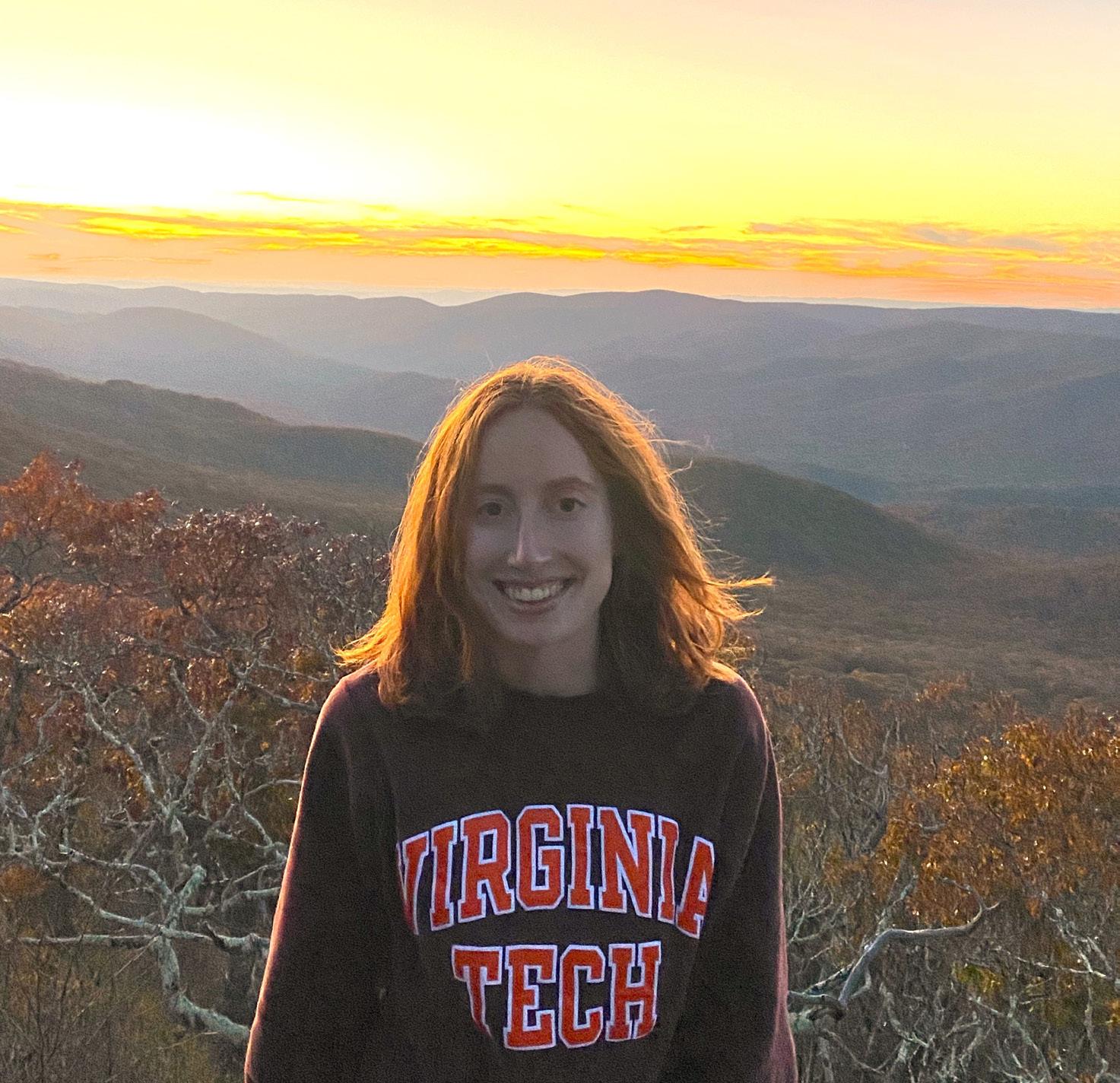
It feels like just yesterday I was faced with making what felt like one of the most daunting decisions of my life: choosing a major. Simply put, I had no idea what I was doing with my life. However, I was a member of VIA, a livinglearning community at Virginia Tech that guides students like me through exploring different majors and career paths. Here, I knew I wasn’t alone in this decision process, and I had a group of friends and an amazing advisor to guide me through it.
Initially, my heart was set on a STEM-related career until I experienced the true horrors of math labs during the spring semester of my freshman year. On top of that, it seemed as if the only assignments in these classes that I truly enjoyed were the ones where I would be reading, writing and revising research papers. Moments like these would remind me of my passion for editing and writing in general — both of which I have enjoyed for as long as I can remember. All of freshman year and into the beginning of my sophomore year, I felt a small yet persistent voice inside of me telling me to work towards a career in writing and editing. It wasn’t until my mom suggested one night that I should choose a writing major that I really began to put some thought into this. I ended up choosing to major in professional and technical writing as well as creative writing to get a good balance on both types of writing styles.
Despite enjoying writing throughout my life, there was something holding me back — I was terrified of sharing my work with an audience. Anything I put down on paper felt extremely personal to me, even if it wasn’t on a personal topic. I knew that this fear was something that I needed to get over, and I could feel the small voice inside of me pushing me to overcome this, and to do this, I knew I needed an outlet where I
could get my work published.
I decided to attend an interest meeting for the Collegiate Times during the beginning of my junior year. Not only did this help me overcome my fear, but it was also a great opportunity for me to gain a lot of editing experience. I will never forget claiming my first pitch for the lifestyles section and seeing my first article in print. Rather than feeling anxious about my work being out there for everyone to see, all I could think about was not only how cool it is to have a physical, tangible copy of my work. Best of all, I loved that through my published work, I could educate others on topics that I care about. Being a copy editor as well, I enjoyed getting to be part of this audience; through every piece that I read over each week, I learned so much about the Blacksburg community and beyond. The staff at the Collegiate Times served as an amazing support group for me that helped me to grow and develop as a writer and gain confidence in my abilities. And when I officially joined the team as an editor, I got to help fellow writers feel excited about their own work too.
My experience at the Collegiate Times has further confirmed that pursuing a career in writing and editing was the right choice. It took a little bit of trailblazing during my freshman year to set myself on the right track. Taking a bunch of STEM classes and trusting my gut helped guide me towards the right major, and everything fell into place from there. My biggest piece of advice for incoming freshmen is that it is completely OK to not know a set major or career path just yet. Decisions like these will naturally take some time — and trailblazing — so don’t rush through it! Even though some of the STEM classes I took were not fully related to my majors, there were small overlaps like writing research papers that
helped remind me of my passion for writing. Something else that I strongly feel is important to do is to get involved with clubs, organizations and living-learning communities as soon as you can. VIA was an amazing support group for me while deciding on my majors, and once I did, the Collegiate Times was a great place for me to grow as a writer and editor, and also be surrounded by other students who shared my passions. Through my time as a student here,
I’ve learned that the university has so much to offer to guide you through any important life decision. Just know that even if you are a student like I was — completely unsure of where life will take you — if you happen to find yourself at Virginia Tech, you are already one step in the right direction.
This is the first time I have ever not looked forward to writing an article.
It’s hard, even as a writer, to put into words what being a part of the Collegiate Times has meant to me over the last four years. I’ve said this numerous times throughout my college career, but the newspaper made me feel like I belonged at Virginia Tech and in my degree.
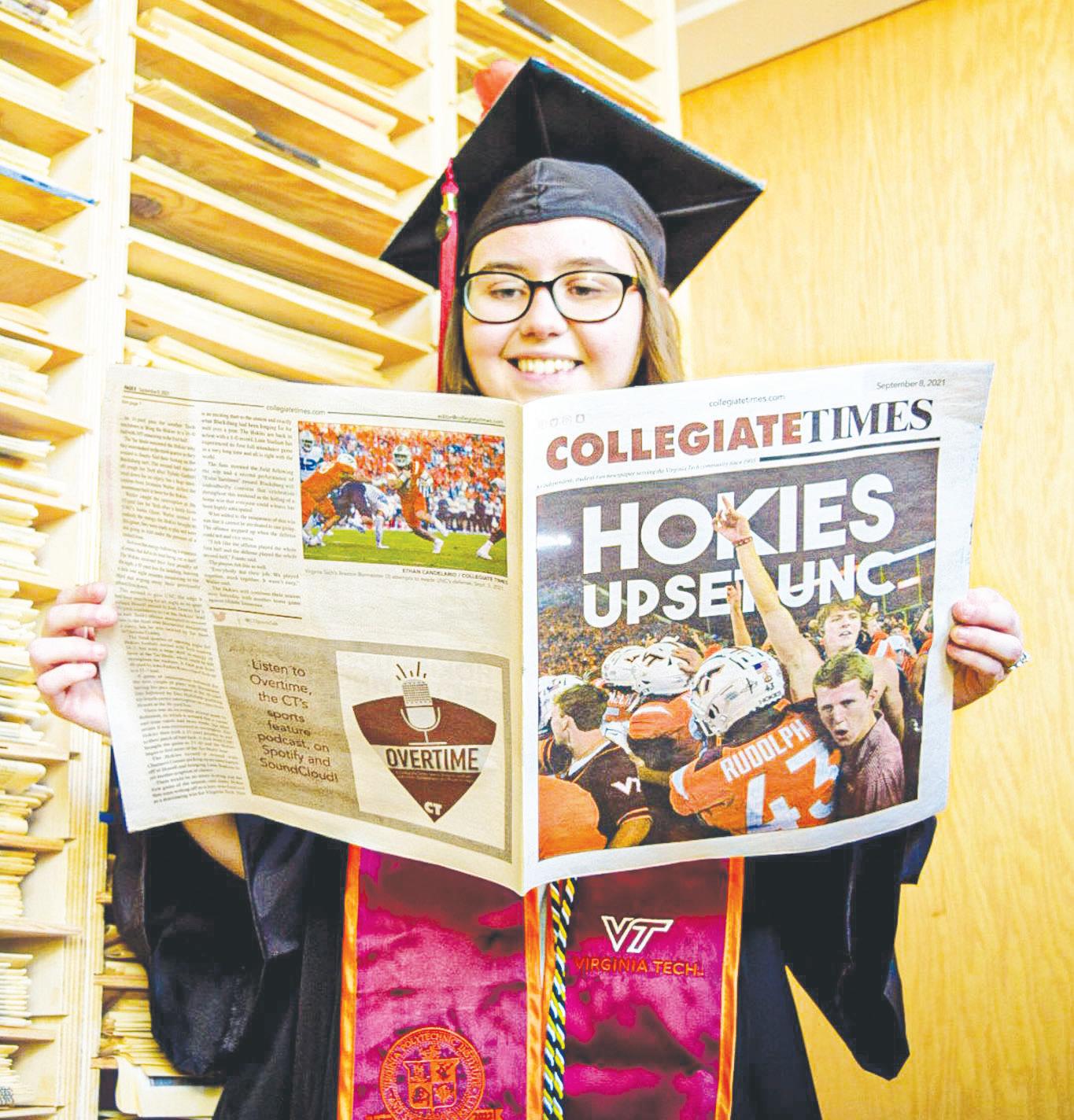
As a freshman, my first semester at Tech was really hard, as it is for many students. I ended up realizing I was not meant for the first major I was pursuing and changed my major to sports media and analytics. The problem was I had zero experience in journalism.
My advisor said I should reach out to the Collegiate Times, which I hastily did. At my first meeting, I realized I would be one of two women in the sports section. However, there was an amazing writer, Claire Castagno,
who was assistant sports editor at the time. Castagno helped me feel comfortable in the space, but truly everyone was welcoming. I immediately felt at home.
All of the sports editors taught me so much as I was starting out in my degree and made me realize I had chosen the correct career path. I no longer felt that I was behind everyone else or that I was incapable.
Eventually, I worked my way up to the position I have now. I still remember when I was promoted to sports editor from assistant editor on Zoom during the pandemic and how excited I was. I stayed “professional” until the end of the meeting, but I was screaming and jumping up and down on the inside.
I am graduating with my byline on many stories, and this is all thanks to the Collegiate
continued on page 6

Times.
continued from page 3
The experiences I have had will last a lifetime, regardless of where my career takes me. I’ll never forget covering the men’s basketball ACC Tournament in Greensboro and covering two away football games and getting to explore new cities. I got to cover the first game under a new football coach, interview countless athletes and coaches and have a professional singer repost one of my articles. These are just some of the amazing moments I have been able to experience simply because one day I decided to walk into the CT newsroom.
In all of the chaos of simply growing up, learning and working towards a degree these last four years, the Collegiate Times was always a constant. The newsroom was a sanctuary of calm for me. I grew as a journalist on the third floor of Squires and with my press passes hung around my neck at games, and all of those moments will help the next part of my
career.
Even though it’s time to log out of our content management system and the shared Google Drives, pack up my newspaper clippings and press passes, I’ll always have these memories.
With that, I am so excited for the future of this paper and the sports section. We have selected two amazing assistant sports editors who will become the new leaders of this section, and I can’t wait to see what they do.
It’s been an amazing ride. In less than two weeks, I will put on my cap, which is decorated with an old article of mine, and officially say goodbye to the place that changed everything.

Signing off from Blacksburg one final time.
It’s so hard to know how these sorts of things will end.
These past few years have been a roller coaster. I came to Virginia Tech dead set on becoming a sports writer. Then, I tried my hand at play-by-play broadcasting, fell in love with it and chose that as my new career goal. That led me to pursuing other endeavors such as on-camera reporting, becoming a production assistant at ACC Network and serving as an intern for the leading news station in the New River Valley, WDBJ7.
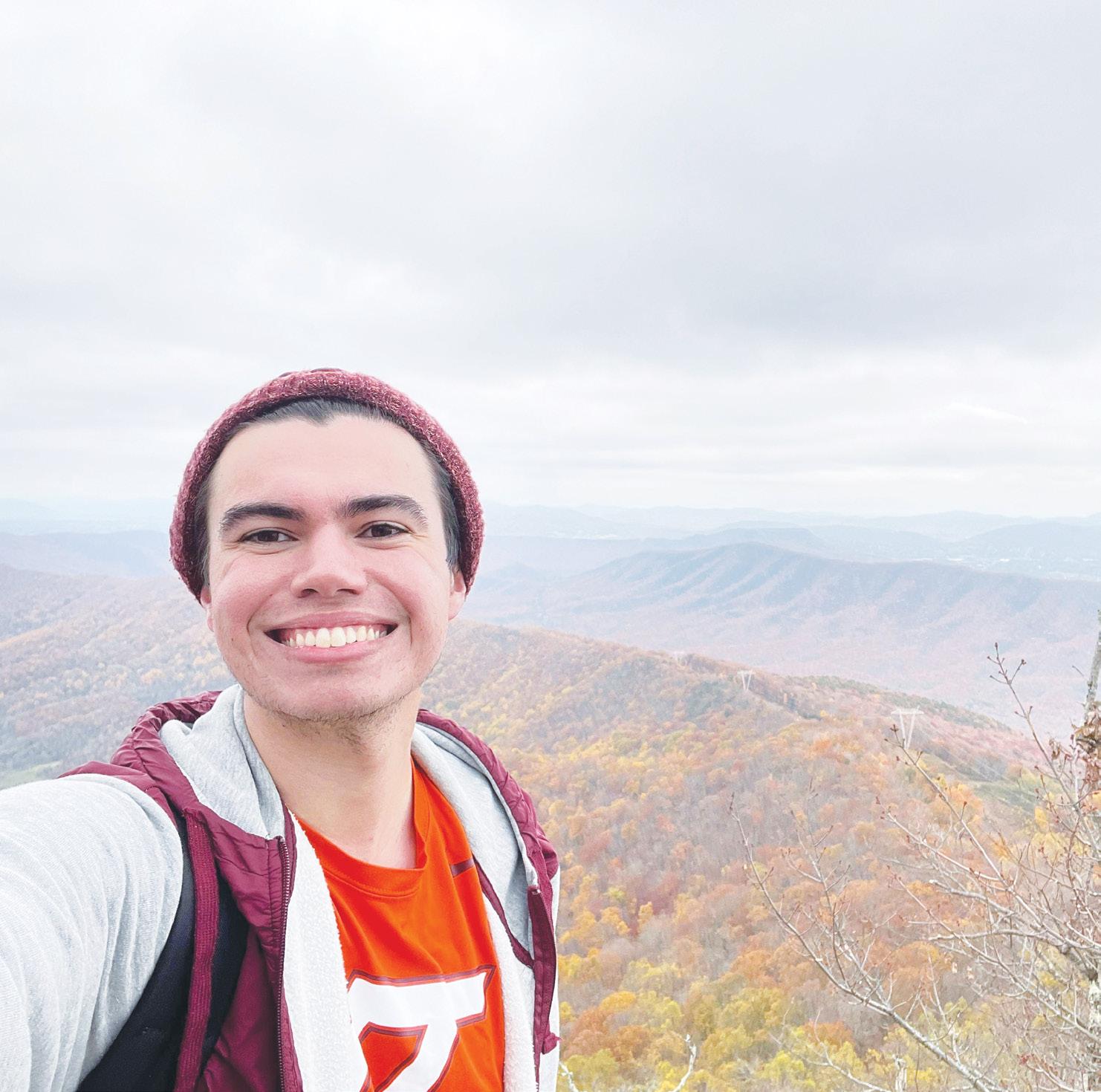
But no matter what I do next, no matter how much I accomplish, when people look at a timeline of my career and all of the things I’ve done, the Collegiate Times will be at the top of that list. I couldn’t be more grateful for that fact.
I’ve been with the Collegiate Times sports section for four years, three as a writer and one as an editor. I’ve been present for so much Virginia Tech sports history over the years. I covered Bud Foster’s last home game as the defensive coordinator for football as a freshman. I was there for Virginia Tech women’s basketball’s first ACC championship. I’ve sat in on countless press conferences, asking questions to the likes of Mike Young, Kenny Brooks, Brent Pry, Justin Fuente and so many others.
So many moments, upsets, heartbreakers, nail biters and everything in between. I will remember all of it. I am thankful for every last bit of it.
But the one thing that I’ll remember most of all is the people. My old editors Robby Fletcher, Davis Carbaugh, Claire Castagno and Devin Shepard. My fellow editor Amber Williams. The editors who will be taking me and Amber’s places, Sam Mostow and Thomas Bray. All of the writers I’ve worked with over the years. They are what truly made this job fun and I hope I have done for them what they have done for me.
In closing, there isn’t an ounce of progress I’ve made in my career in which the Collegiate Times has not been partially responsible. I wish nothing but the best for this paper as I move on with my career and my life.
Social media editors Deanna Driver and Emily Logue offer some parting words of advice from their time in college.
This is our first and last article. We have been running the CT social media channels for the past three years, and we’ve seen just about every article this newspaper has put out since May 2020. We never took the opportunity to write our own articles, and there is a piece of us that will always regret it. We loved seeing how much this place has changed and how strong our paper has become. The people we’ve been
surrounded by are so passionate and dedicated. The CT has taught us so much about the field of journalism and our future paths.
Deanna plans to attend Colorado State University pursuing a masters in addictions counseling.
Emily plans to attend Virginia Tech pursuing a masters in communications while working as a GA for HokieVision.
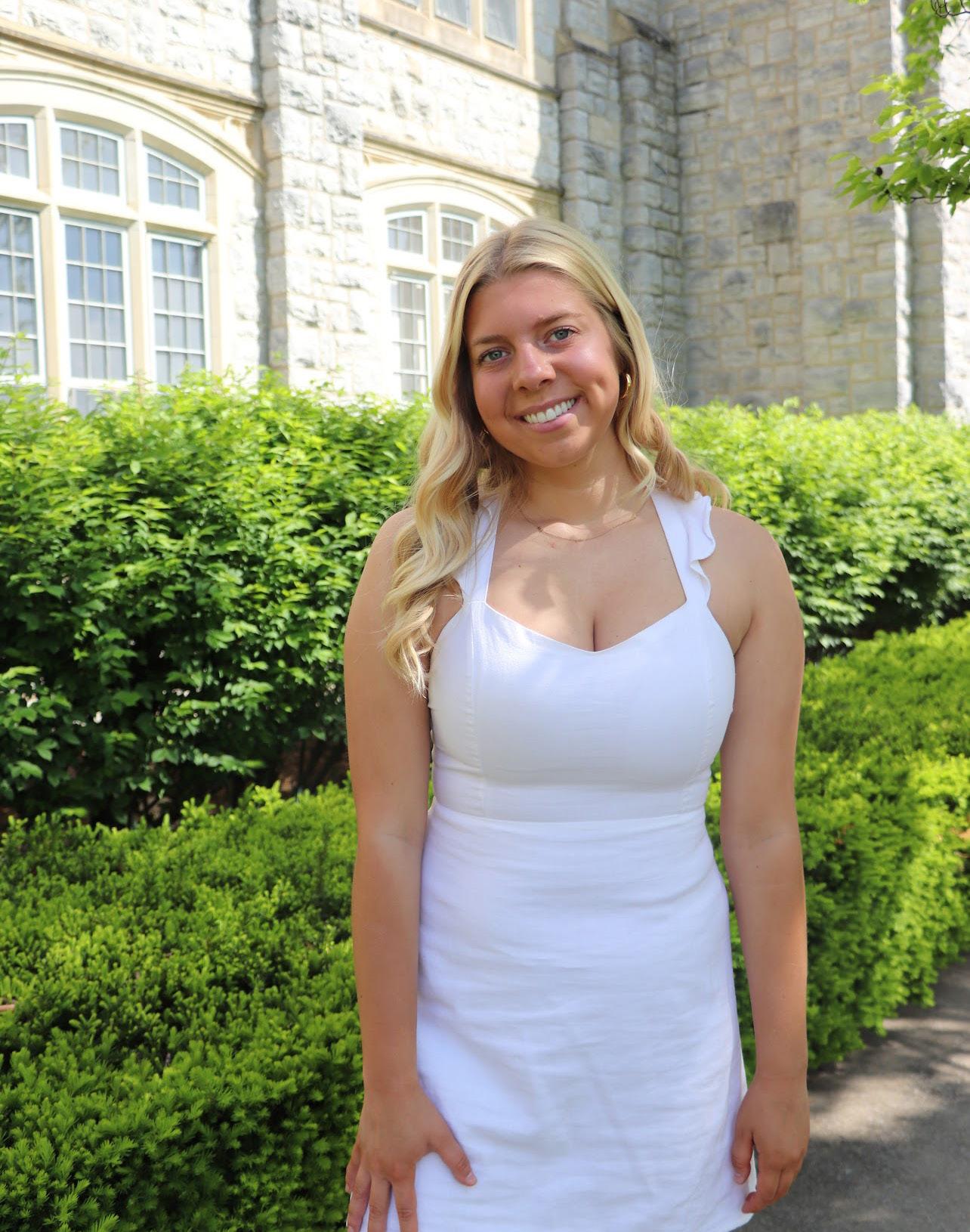
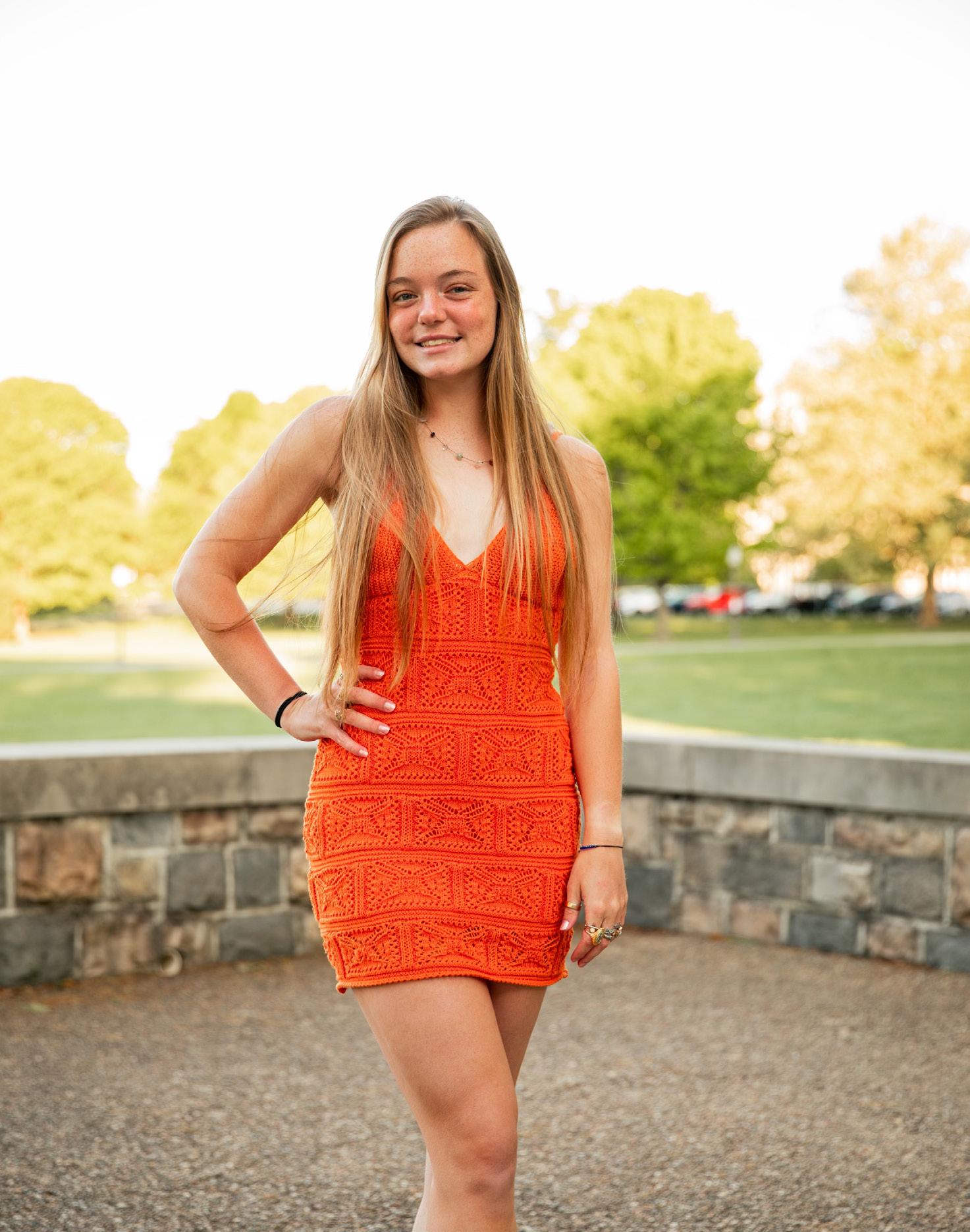
After our time together and our time at Virginia Tech, we have created our best tips to survive in Blacksburg and Virginia Tech:
• Don’t go to Bennys after 2 a.m.
• Blacksburg Transit is not scary.
• Don’t expect to ever be able to park in the Squires lot.
• Sharkeys’ happy hour is unbeatable.
• Schedule your classes with friends.
• Don’t leave football games after Enter
Sandman.
• The Cellar basement is a hidden gem.
• Join the CT.
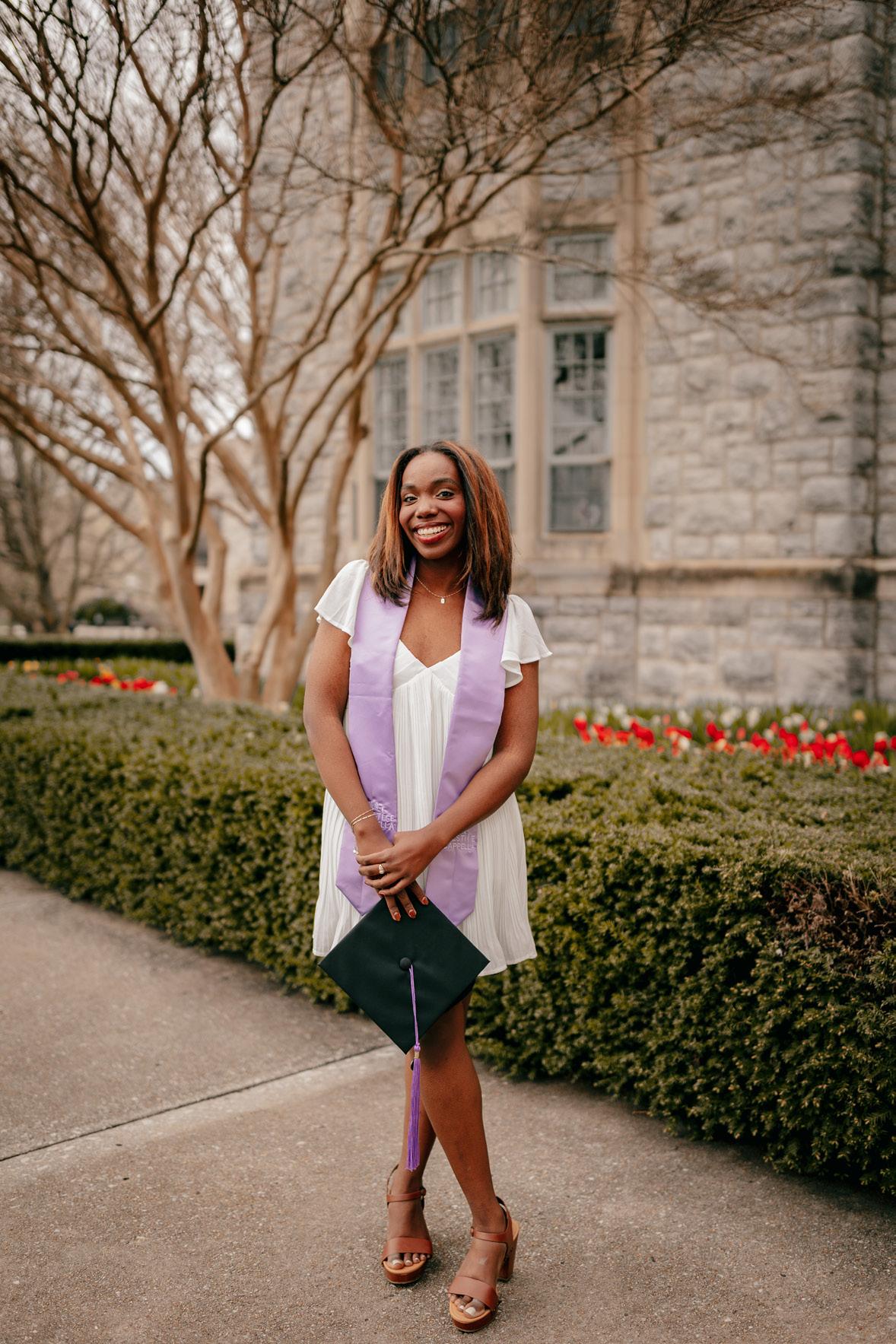
A tribute to the enduring constant in my life.
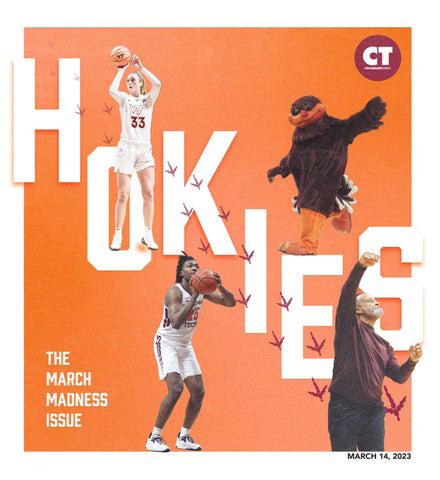
Well, this is a first.
I feel so excited, yet bittersweet while writing this. I have never considered myself a writer, but being able to share a little sentiment in print is very cool to me, so this is me trying my best. While writing was never my safe haven while on the Collegiate Times, design definitely was. As a freshman graphic design major, I knew I wanted to explore design opportunities outside of class. I craved exploring any other mediums of design I could. Collegiate Times was quite the gem to
find. It became such a calm and serene place for me to spend time doing what I love. I first fell in love with design during my sophomore year of high school in my yearbook class. While many of my friends took to interviewing and writing stories about the student body, I found myself enamored with the process of creating spreads. Putting together each element became like my own little puzzle I couldn’t get enough of. That’s what drew me to direct all my focus to it, and I went on to become Head Design Editor my senior year of high school. I thought my love for print design may fade
when coming to college, but it ignited even more when I found the Collegiate Times. Being able to have so much creative freedom with such a loving, supportive, and talented staff surrounding me is a true gift. I’ll truly miss that, because I know it may not be like this in the real world and I’m grateful I got to soak it in for three incredible years.
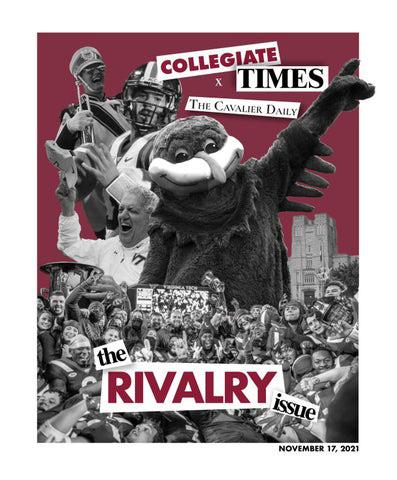
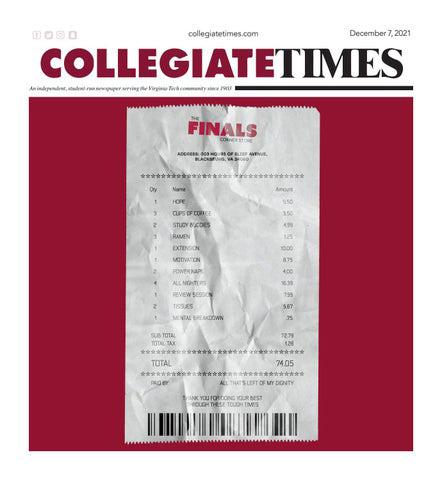
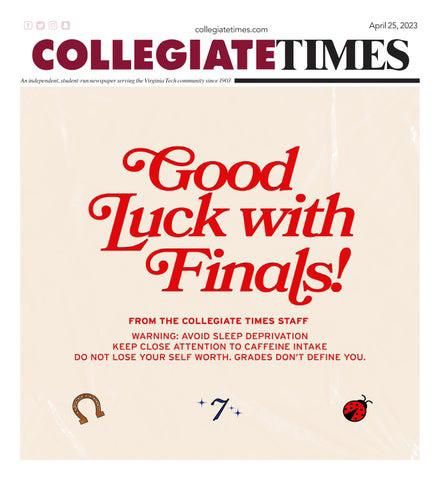
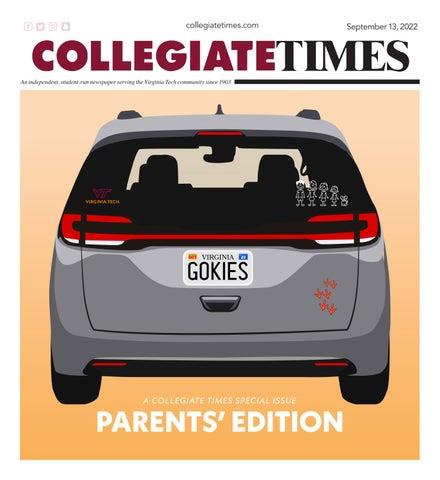
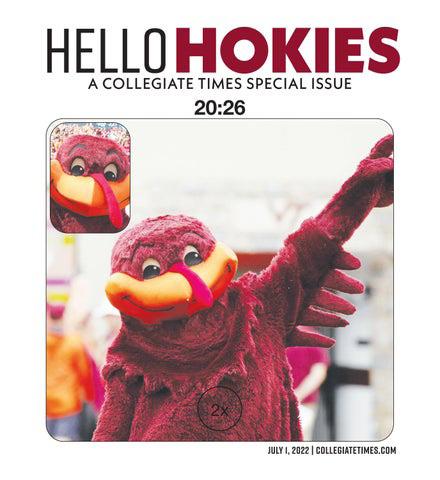
It’s really hard to deal with change, especially accepting the fact that I’m leaving a place I associate so many beautiful memories with. The one thing I’m absolutely certain of is that
design will always be my constant. I couldn’t imagine a world without it and I am so thrilled to be contributing my creativity with a much bigger world so very soon. Thank you for making me who I am today, CT.